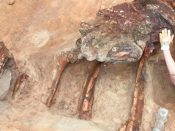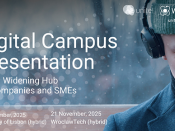Extreme Value Laws and Point Processes of Rare Events for Chaotic Dynamical Systems
Ana Cristina Moreira Freitas
FEP and CMUP, Universidade do Porto
We consider discrete time dynamical systems and show the linking between Extreme Value Laws and Hitting Time Statistics. The stochastic processes arise from dynamical systems by evaluating an observable function (which achieves a global maximum at a single point of the phase space) along the orbits of the system. We exploit the connection between these two approaches both in the absence and presence of clustering. We associate the existence of an Extremal Index less than 1 to the occurrence of periodic phenomena. We show that, under certain conditions, in the absence of clustering, the point processes of exceedances converge to a standard Poisson process. In the presence of clustering, the point processes converge to a compound Poisson process, so instead of single exceedances, we have entire clusters of exceedances occurring at Poisson times with a geometric distribution ruling its multiplicity. We will also consider observables achieving a global maximum at multiple points which are correlated by belonging to the same orbit of a certain chosen point. We will see that this is a mechanism capable of creating clustering without an underlying periodic phenomenon and with different types of patterns.
Complete Convergence of Rare Events Point Processes and Records with Clustering
Jorge Milhazes de Freitas
FCUP and CMUP, Universidade do Porto
We consider time series corresponding to the evaluation of given potential along the orbits of systems with `nice' first return induced maps. Nice, here, means good memory loss properties. We are particularly interested in events corresponding to exceedances of high thresholds, i.e. instants at which the potential reaches abnormally high values, and, more specifically, when these exceedances have a tendency to appear in clusters. This clustering effect is known to be related to some form of underlying periodicity and we study its effects in the convergence of conveniently normalised point processes that count the number of exceedances in a certain time frame. We consider bidimensional point processes marking the exceedance instants in the x-axis and their severity in the y-axis. The convergence of these bidimensional processes is then used to obtain information about records.





















